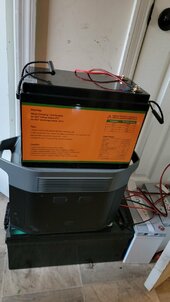Hi brains trust,
Am looking to hear suggestions for a simple solar garden setup from a girl with zero experience .
Due to housing crisis will be living in a yurt in a garden. Gas will be used for water heating. I will need power to cover 4kwh a day use (this is based on a recent electric bill i had living in a granny flat/demountable donga). Running things like convection top stove, vacuum cleaner, led lights, fans etc.
I've been trawling this site and see a couple of main options for a setup being 1; a standard solar setup and 2; the Aio route.
I'm leaning towards The Aio ecoflow 1800. They around 1500 aud throw in a couple of panels and setup going to be approx. 2k aud.
The other route scares me a little as I'm on my own and don't know how to wire anything up, but I do love a challenge.
My questions are........
what items will i need for a "wired setup" solar be?
panels (how many?)
inverter (3000w proffered)
i would like 24v as reading here 12v is only going to be upgraded. 24v is just a battery size correct?
a regulator from panels to battery
A question for the Aio route is
can they run off any panel ?
are they able to be used for a home setup?
I read on ecoflow website they really for power outage camping etc.? I read here that maybe if the power isn't drained and topped up and drained and topped up etc that the life of the system can be reduced.
The appeal for an Aio for me is obvious ease of use and portability and if i could get a 5 year warranty could easy pay itself off compared to using electric from the grid.
Am looking to hear suggestions for a simple solar garden setup from a girl with zero experience .
Due to housing crisis will be living in a yurt in a garden. Gas will be used for water heating. I will need power to cover 4kwh a day use (this is based on a recent electric bill i had living in a granny flat/demountable donga). Running things like convection top stove, vacuum cleaner, led lights, fans etc.
I've been trawling this site and see a couple of main options for a setup being 1; a standard solar setup and 2; the Aio route.
I'm leaning towards The Aio ecoflow 1800. They around 1500 aud throw in a couple of panels and setup going to be approx. 2k aud.
The other route scares me a little as I'm on my own and don't know how to wire anything up, but I do love a challenge.
My questions are........
what items will i need for a "wired setup" solar be?
panels (how many?)
inverter (3000w proffered)
i would like 24v as reading here 12v is only going to be upgraded. 24v is just a battery size correct?
a regulator from panels to battery
A question for the Aio route is
can they run off any panel ?
are they able to be used for a home setup?
I read on ecoflow website they really for power outage camping etc.? I read here that maybe if the power isn't drained and topped up and drained and topped up etc that the life of the system can be reduced.
The appeal for an Aio for me is obvious ease of use and portability and if i could get a 5 year warranty could easy pay itself off compared to using electric from the grid.




